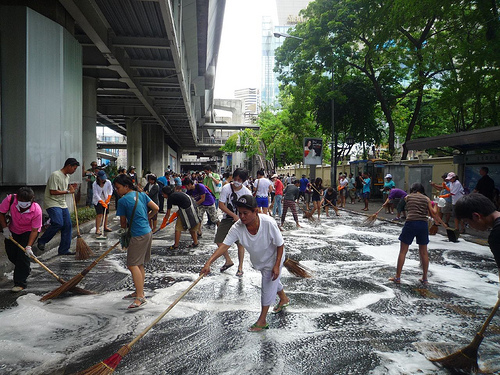
[Two days ago I wrote a short piece below for an Op-Ed page of a U.S. newspaper, but unfortunately they couldn’t use it due to the paper lacking enough space for it still be news. So I decided to put it up on my blog.]
Cleansing the City of Angels

On a clear Sunday afternoon of 23 May 2010, four days after the anti-government rally of United Front for Democracy against Dictatorship (UDD, nicknamed “red-shirts” for the color they chose) was dramatically dispersed by the Thai Army, I went downtown to central Bangkok to witness the “Big Cleaning Day” event hosted by the Bangkok Metropolitan Administration.
At least 1,000 volunteers showed up to help clean the streets of grime, debris, and political graffiti left behind by the thousands of protesters who turned the typically busy Ratchaprasong (literally “royal intent”) intersection into a makeshift rebel camp. Municipal water trucks slowly moved down the streets, pumping water from hoses for volunteer cleaners who scrubbed and swept the streets with passion and solidarity. The smell of detergent in the air mixed uneasily with the lingering odor of charred wreckage of Central World, one of Thailand’s glitziest shopping malls. Hundreds of people came to take photos of and with this instant ‘tourist attraction,’ including foreigners and whole families.
I counted no less than 10 pick-up trucks that slowly drove through the crowd, people in the back freely handing out bottles of water, soda, and face masks to volunteers. A couple offered me a tray full of bags of guava slices, neatly bundled with chili and sugar dip the way we like to eat it. “Take one,” they insisted, and flashed me a smile. Right then, I felt so good that, had I turn around and gone home, I might feel reassured that this political crisis is a thing of the past, swept away like grime on the streets.
If only it were that simple.
Less than two blocks away sits Wat Patumwanaram, a temple that was supposed to be a sanctuary amidst the crackdown, a place where over 1,000 protesters, mostly old people, women and children, moved from the main protest stage at Ratchaprasong intersection to seek refuge from the firefight. But what they found was anything but.
On the day of the crackdown, Mark MacKinnon, East Asia correspondent for The Globe in Canada, was trapped inside this temple alongside terrified protesters. As gunfight raged on right outside, MacKinnon sent minute-by-minute updates via Twitter and uploaded photos from his mobile phone while the Thai mainstream media remained silent. At one point he tweeted that 6 people have been shot dead according to a medic, and begged for help. Eventually a ceasefire was negotiated to let the wounded leave to a hospital just across the street.
Afterwards, many photos and eyewitness accounts surfaced on the Internet, all of which seem to confirm that dead protesters were victims of sniper fire. Several people reported seeing snipers clad in army uniforms move around on overhead railway of Bangkok’s skytrain system. The government claims that these snipers are an “unknown armed force,” but has yet to announce a formal investigation into the matter, even though these snipers could be responsible for many of the 85 deaths reported between 12 March and 19 May.
Today, the temple’s serene atmosphere saw no sign of terror that punctuated MacKinnon’s tweets only four days ago. While dozens of volunteers swept the streets right outside, there were only a few people inside the temple. An old man showed me the spot where he said people were killed.
As I walked back to my car, I wondered how we can halt the destructive “us vs. them” attitude. Most pro-government Thais, many of whom showed up to clean the streets today, see the red-shirts as anti-royal terrorists either hired or conned by Thaksin Shinawatra, billionaire ex-Prime Minister who was ousted in a coup in 2006. On the other hand, most red-shirts see themselves as peaceful freedom fighters with a noble goal of restoring true democracy to Thailand, and insist that they are already “beyond Thaksin.” Recently the battlefield has shifted from the streets into cyberspace, where “cyber warriors” upload and refute endless streams of photos, video clips, and eyewitness accounts that tell only facts that favor their side. The government urges reconciliation, but I wonder how we can reconcile without first coming to terms with truth from all sides.
Today, central Bangkok streets are cleaner than ever before. But I fear that the cleansing process in our hearts and minds has yet to begin
